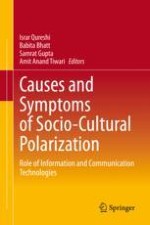2022 | OriginalPaper | Buchkapitel
Future Research Directions in Polarization
verfasst von : Israr Qureshi, Babita Bhat, Samrat Gupta, Amit Anand Tiwari
Erschienen in: Causes and Symptoms of Socio-Cultural Polarization
Verlag: Springer Singapore
Aktivieren Sie unsere intelligente Suche, um passende Fachinhalte oder Patente zu finden.
Wählen Sie Textabschnitte aus um mit Künstlicher Intelligenz passenden Patente zu finden. powered by
Markieren Sie Textabschnitte, um KI-gestützt weitere passende Inhalte zu finden. powered by
